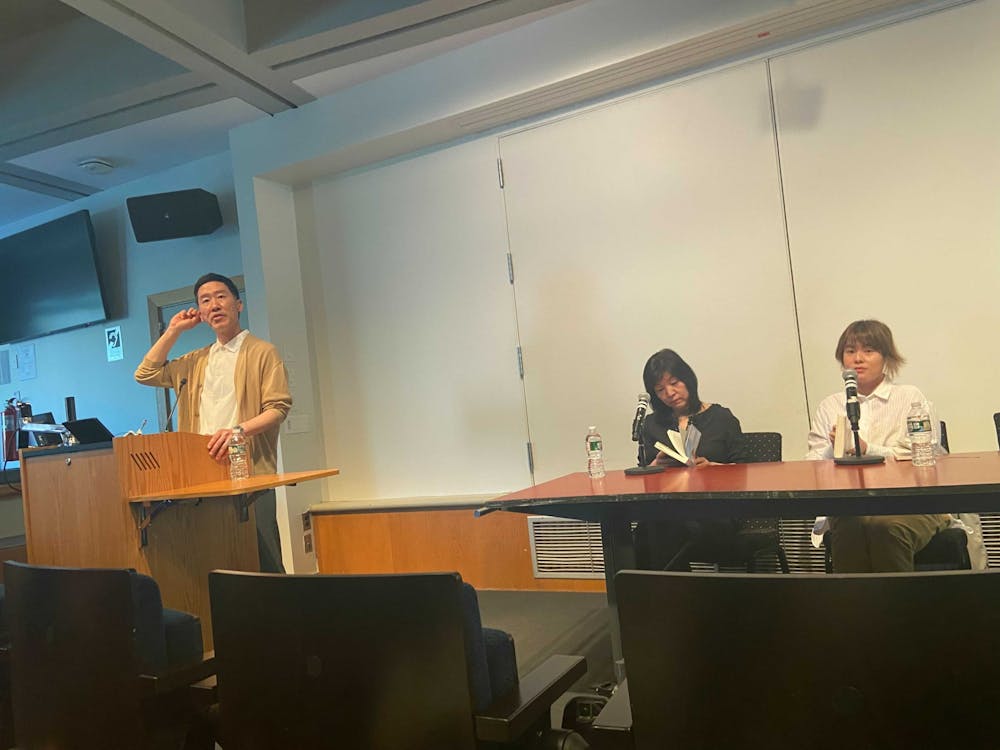Among a wide expanse of chattering undergraduates, enthusiastic graduate students, and a few elderly citizens listening while she sketches her likeness into the paper, the author Kyung-sook Shin sits in the front of Betts Auditorium, quiet and expectant.
The event opened with a note of thanks from East Asian Studies Professor Steven Chung, who introduced Shin not only through her extensive works which have been “imbued with disillusionment,” but as a novelist belonging to a wave of authors led by women between Korea's authoritative era and the contemporary.
Her introduction does her justice; she’s not only a heavily-decorated, beloved Korean author within Asian contemporary literature, but she has claimed popularity which has broken through the international book market into the U.S., holding her place amongst names like Hang Kang and Min Jin Lee.
Debuting her newly-translated book “I Went Home to See my Father,” an adjacent fictitious familial tale to her 2009 novel “Please Look After Mom,” Shin reads five personally-selected passages about the discovery of a father’s life through the hauntings of trauma and the afterlives of war which fall as familial inheritances.
Shin notes that the book’s dedication holds the central theme of the novel: “It’s about a man who constantly says he’s done nothing at all; this novel is evidence of the life and stories he’s lived through that I’m dedicating to him. The book came out on March 5th two years ago, and my father passed away August 12th of that same year. I see it as he was waiting for me and for this book to come out before he decided to say goodbye.”
Throughout the reading, Shin’s voice is soft and subdued, giving room to hold the weight of these topics, allowing the words themselves to break the surface of the room and to breathe air into the gills of its reception.
While holding all the gravity of the topics and history she narrates, Shin balances these excerpts with anecdotal stories and light-hearted jokes where she was quick to laugh along.
After an excerpt recounting a moment where a war-time friend of the protagonist’s father, Park Muleung, had to point a gun against him under duress, Shin remarked that she wanted to give her favorite character, Muleung, peace and beauty and to provide him with aesthetic inspiration through his name. The name itself represents an ideal place that doesn’t exist in this world.

In Korean, Shin shared that after a signing at the Korean Society in New York, a reader told her, “I will find you this peace, if you go to church.”
The laughter followed in waves, first by those who understood Korean, and then by those who listened to the translator Helen Kim's direct translation.
Later, when asked how she managed to convey beautiful, photographic scenes, Shin replied, “I’m not sure … My guess is that, you know, if my scenes were read to you as beautiful and scenic, I think it might be because the reader themself is beautiful.”
Paralleling the tender and intricately-layered moments explored in “I Went Home to See my Father,” Shin similarly speaks in a moving way. In memorializing, remembering, and holding onto pieces of stories which belong to parents and grandparents only a couple decades before, Shin finds unity in the “things that went missing between her and her parents,” as well as in the fragmentation of these wartime stories through the knowledge that they exist. Her archival and slow exploration traces the fault lines of splintering of identity and encourages the act of remembering genealogy.

Shin shares, “I was able to discover a lot of details about my father I didn’t know, one of which was due to a very, very tragic and traumatic experience he had in the past. He was unable to sleep. The fact that his brain would not let him rest; it pained me so much… That led me to look into my father’s life in detail more, to pay attention. Through this discovery, I realized that inside my dad, in his own personal history, was the history of modern Korea, the wartime, the many events that his whole generation had gone through that I had only abstractly thought about; I realized was lived through my father’s body, his whole life as well. This book is a resulting dedication I’m making to my father… I brought a copy of the book to my dad. He said to me, ‘Kyung-sook brought another book.’ I saw him stroking the cover of my book with his hand.”
Shin also cites the central role and inspiration of her hometown in her writing: “When I write a scene, especially a scene featuring a beautiful landscape or nature, they are all inspired by the scenery I witnessed the first 16 years of my life living in the small country town called Jeongeup in South Korea, where I was born and raised. And although so much has changed even in my hometown now, the scenes of my childhood no longer exist there, but they are still in my heart. When I think back on it, I hear the winds whisper in my ears, I see the vast green that my siblings and I used to run around. Those memories in my heart enable me to write these scenes. It comes very naturally to me; it’s not an effort. It just comes out.”
The reading was long, but the excerpts longer, perhaps to hold a silence or pause for what they carry.
After the readings followed a Q&A which went into a deep discussion of artistic practice, with time for only three questions from the audience and a small moment for book signing during the subsequent reception.
Penned in the books with a fountain pen, Shin wrote, “Dream a new dream, and fulfill that dream.”
Quotes are direct translations done by the translator Helen Kim.
Macy Kwon is a contributing writer for The Prospect. She can be reached at mk8440@princeton.edu.








